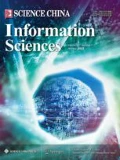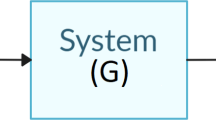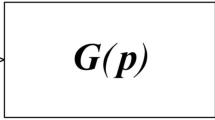Abstract
The finite-time horizon optimal control problem is investigated for discrete-time dynamical systems defined on a continuous domain. First, the original optimal control problem in the continuous domain is approximated as one on a finite-valued domain based on a special quantification process. Under suitable assumptions, convergence analysis of the approximate optimal cost of the quantified system to the optimal cost of the original system was established with error estimation. Thereafter, the approximate problem is solved using a logical network-based method that is proposed based on the semi-tensor product of the matrix. Finally, the proposed scheme is applied to deal with the optimal control problem of a hybrid electric vehicle (HEV) powertrain system, and its effectiveness is shown by a series of simulation results.
Similar content being viewed by others
References
Eriksson L, Nielsen L. Modeling and Control of Engines and Drivelines. Hoboken: John Wiley & Sons, 2014
Zhang J, Shen T, Kako J. Short-term optimal energy management of power-split hybrid electric vehicles under velocity tracking control. IEEE Trans Veh Technol, 2020, 69: 182–193
Bock H G, Plitt K J. A multiple shooting algorithm for direct solution of optimal control problems. IFAC Proc Vol, 1984, 17: 1603–1608
Banks S P, Dinesh K. Approximate optimal control and stability of nonlinear finite-and infinite-dimensional systems. Ann Oper Res, 2000, 98: 19–44
Delprat S, Lauber J, Guerra T M, et al. Control of a parallel hybrid powertrain: optimal control. IEEE Trans Veh Technol, 2004, 53: 872–881
Serrao L, Onori S, Rizzoni G. A comparative analysis of energy management strategies for hybrid electric vehicles. J Dynamic Syst Measurement Control, 2011, 133: 031012
Martinez C M, Hu X, Cao D, et al. Energy management in plug-in hybrid electric vehicles: recent progress and a connected vehicles perspective. IEEE Trans Veh Technol, 2016, 66: 4534–4549
Yang Y, Hu X, Pei H, et al. Comparison of power-split and parallel hybrid powertrain architectures with a single electric machine: dynamic programming approach. Appl Energy, 2016, 168: 683–690
Wang R, Lukic S M. Dynamic programming technique in hybrid electric vehicle optimization. In: Proceedings of IEEE International Electric Vehicle Conference (IEVC), 2012. 1–8
Tang L, Rizzoni G, Lukas M. Comparison of dynamic programming-based energy management strategies including battery life optimization. In: Proceedings of International Conference on Electrical Systems for Aircraft, Railway, Ship Propulsion and Road Vehicles & International Transportation Electrification Conference (ESARS-ITEC), 2016. 1–6
Koot M, Kessels J T B A, de Jager B, et al. Energy management strategies for vehicular electric power systems. IEEE Trans Veh Technol, 2005, 54: 771–782
Chen Z, Mi C C, Xu J, et al. Energy management for a power-split plug-in hybrid electric vehicle based on dynamic programming and neural networks. IEEE Trans Veh Technol, 2014, 63: 1567–1580
Yang Y, Pei H, Hu X, et al. Fuel economy optimization of power split hybrid vehicles: a rapid dynamic programming approach. Energy, 2019, 166: 929–938
Pei D, Leamy M J. Dynamic programming-informed equivalent cost minimization control strategies for hybrid-electric vehicles. J Dyn Syst Meas Control, 2013, 135: 051013
Larsson V, Johannesson L, Egardt B. Analytic solutions to the dynamic programming subproblem in hybrid vehicle energy management. IEEE Trans Veh Technol, 2014, 64: 1458–1467
Kauffman S A. Metabolic stability and epigenesis in randomly constructed genetic nets. J Theor Biol, 1969, 22: 437–467
Truemper K, Truemper K. Design of Logic-based Intelligent Systems. Hoboken: John Wiley & Sons, 2004
Cheng D, Qi H. A linear representation of dynamics of boolean networks. IEEE Trans Automat Contr, 2010, 55: 2251–2258
Lu J Q, Li B W, Zhong J. A novel synthesis method for reliable feedback shift registers via Boolean networks. Sci China Inf Sci, 2021, 64: 152207
Yerudkar A, Del Vecchio C, Glielmo L. Feedback stabilization control design for switched Boolean control networks. Automatica, 2020, 116: 108934
Zheng Y T, Li H T, Feng J E. State-feedback set stabilization of logical control networks with state-dependent delay. Sci China Inf Sci, 2021, 64: 169203
Li H, Ding X. A control Lyapunov function approach to feedback stabilization of logical control networks. SIAM J Control Optim, 2019, 57: 810–831
Zhu S Y, Liu Y, Lou Y J, et al. Stabilization of logical control networks: an event-triggered control approach. Sci China Inf Sci, 2020, 63: 112203
Liu Y, Cao J D, Wang L Q, et al. On pinning reachability of probabilistic Boolean control networks. Sci China Inf Sci, 2020, 63: 169201
Chen H, Wang Z, Shen B, et al. Model evaluation of the stochastic Boolean control networks. IEEE Trans Automat Contr, 2022, 67: 4146–4153
Pal R, Datta A, Dougherty E R. Optimal infinite-horizon control for probabilistic Boolean networks. IEEE Trans Signal Process, 2006, 54: 2375–2387
Liu Q, Guo X, Zhou T. Optimal control for probabilistic Boolean networks. IET Syst Biol, 2010, 4: 99–107
Toyoda M, Wu Y. On optimal time-varying feedback controllability for probabilistic Boolean control networks. IEEE Trans Neural Netw Learn Syst, 2020, 31: 2202–2208
Wu Y, Shen T. An algebraic expression of finite horizon optimal control algorithm for stochastic logical dynamical systems. Syst Control Lett, 2015, 82: 108–114
Wu Y, Sun X M, Zhao X, et al. Optimal control of Boolean control networks with average cost: a policy iteration approach. Automatica, 2019, 100: 378–387
Wu Y, Guo Y, Toyoda M. Policy iteration approach to the infinite horizon average optimal control of probabilistic Boolean networks. IEEE Trans Neural Netw Learn Syst, 2020, 32: 2910–2924
Wu Y, Kumar M, Shen T. A stochastic logical system approach to model and optimal control of cyclic variation of residual gas fraction in combustion engines. Appl Thermal Eng, 2016, 93: 251–259
Zhang J Y, Wu Y H. A stochastic logical model-based approximate solution for energy management problem of HEVs. Sci China Inf Sci, 2018, 61: 070207
Papagiannis G, Moschoyiannis S. Deep reinforcement learning for control of probabilistic boolean networks. In: Proceedings of International Conference on Complex Networks and Their Applications. Berlin: Springer, 2020. 361–371
Teo K L, Li B, Yu C, et al. Applied and computational optimal control: a control parametrization approach. In: Springer Optimization and Its Applications. Berlin: Springer, 2021
Goh C J, Teo K L. Control parametrization: a unified approach to optimal control problems with general constraints. Automatica, 1988, 24: 3–18
Zhang J, Wu Y, Shen T. Logical network-based approximate solution of hev energy management problems. In: Proceedings of the 46th Annual Conference of the IEEE Industrial Electronics Society, 2020. 2044–2049
Cheng D, Qi H, Li Z. Analysis and Control of Boolean Networks: A Semi-Tensor Product Approach. Berlin: Springer, 2011
Kirk D E. Optimal Control Theory: An Introduction. New York: Dover Publications, 2004
Mock P, Kühlwein J, Tietge U, et al. The WLTP: how a new test procedure for cars will affect fuel consumption values in the EU. Int Council Clean Trans, 2014, 9: 35–47
Acknowledgements
This work was supported in part by National Natural Science Foundation of China (Grant Nos. 62173062, 61973053, 61773090).
Author information
Authors and Affiliations
Corresponding author
Rights and permissions
About this article
Cite this article
Wu, Y., Zhang, J. & Shen, T. A logical network approximation to optimal control on a continuous domain and its application to HEV control. Sci. China Inf. Sci. 65, 212203 (2022). https://doi.org/10.1007/s11432-021-3446-8
Received:
Revised:
Accepted:
Published:
DOI: https://doi.org/10.1007/s11432-021-3446-8




